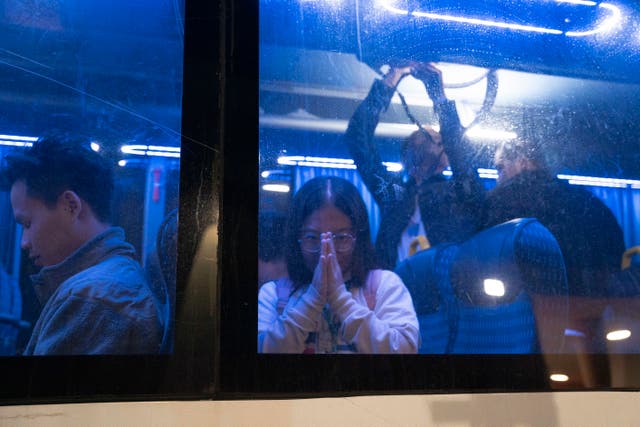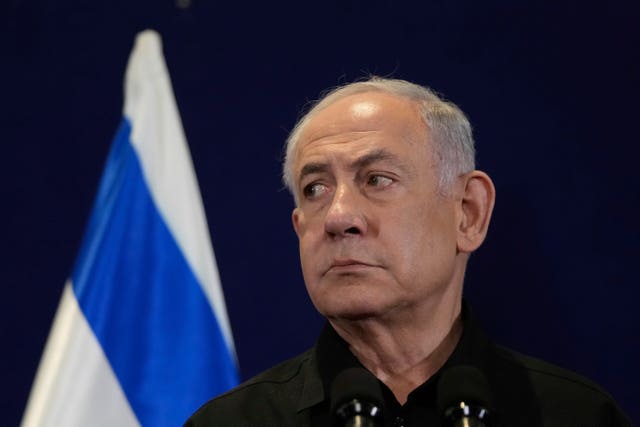Israel releases more Palestinian prisoners on sixth day of Gaza truce
A bus carrying some of the Palestinian detainees was seen arriving in the West Bank city of Ramallah before dawn on Thursday.

Israel has released another group of Palestinian prisoners in exchange for 16 hostages freed earlier by Hamas in Gaza.
A bus carrying some of the Palestinian detainees was seen arriving in the West Bank city of Ramallah before dawn on Thursday.
The releases came on the sixth day of a temporary truce in the Israel-Hamas war.
On each day of the truce, hostages have been traded for Palestinian prisoners, leading to the release of a total of 97 hostages in exchange for an updated total of 210 released prisoners.

Israeli troops arrested her at her West Bank home on November 6 for “inciting to terrorism” on her Instagram account. Her mother said Ms Tamimi’s account had been hacked.
The latest swap for Palestinian prisoners held by Israel under the Gaza truce comes as international mediators raced to seal another extension to allow further exchanges and prolong the halt of Israel’s air and ground offensive.
Hamas released 16 hostages late on Wednesday. The Israeli military said a group of 10 Israeli women and children and four Thai nationals had been returned to Israel, where they were being taken to hospitals to be reunited with their families.
Earlier, two Russian-Israeli women were freed by Hamas in a separate release.

The talks appear to be growing tougher as most of the women and children held by Hamas are freed, and the militants are expected to seek greater releases in return for freeing men and soldiers.
International pressure has mounted for the ceasefire to continue as long as possible after nearly eight weeks of Israeli bombardment and a ground campaign in Gaza that has killed thousands of Palestinians, uprooted three quarters of the population of 2.3 million and led to a humanitarian crisis.
Israel has welcomed the release of dozens of hostages in recent days and says it will maintain the truce if Hamas keeps freeing captives.
Still, Israel’s Prime Minister Benjamin Netanyahu underscored on Wednesday that Israel will resume its campaign to eliminate Hamas, which has ruled Gaza for 16 years and orchestrated the deadly attack on Israel that triggered the war.
“After this phase of returning our abductees is exhausted, will Israel return to fighting? So my answer is an unequivocal yes,” he said. “There is no way we are not going back to fighting until the end.”
He spoke ahead of a visit to the region by US secretary of state Antony Blinken to press for further extensions of the truce and hostage releases. Mr Blinken arrived in Israel late on Wednesday.
In the West Bank, Israeli troops killed two Palestinian boys — an eight-year-old and a 15-year-old — during a raid on the town of Jenin, Palestinian health officials said.
Security footage showed a group of boys in the street who start to run, except for one who falls to the ground, bleeding.
The Israeli military said its troops fired on people who threw explosives at them but did not specify if it was referring to the boys, who are not seen throwing anything.
Separately, the military said its troops killed two Islamic Jihad militants during the raid.
So far, the Israeli onslaught in Gaza seems to have had little effect on Hamas’ rule, evidenced by its ability to conduct complex negotiations, enforce the ceasefire among other armed groups, and orchestrate the release of hostages. Hamas leaders, including Yehya Sinwar, have likely relocated to the south.
With Israeli troops holding much of northern Gaza, a ground invasion south will likely bring an escalating cost in Palestinian lives and destruction.
Most of Gaza’s population is now crammed into the south. The truce has brought them relief from bombardment, but the days of calm have been taken up in a frenzied rush to obtain supplies to feed their families as aid enters in greater, but still insufficient, amounts.
The US, Israel’s main ally, has shown greater reticence over the impact of the war in Gaza.
The Biden administration has told Israel that if it launches an offensive in the south, it must operate with far greater precision.





